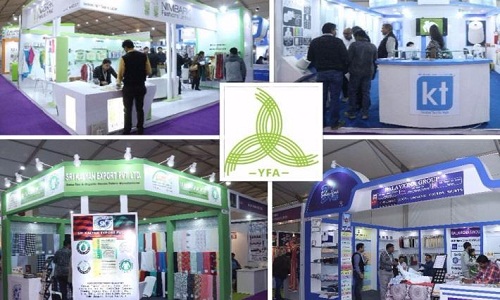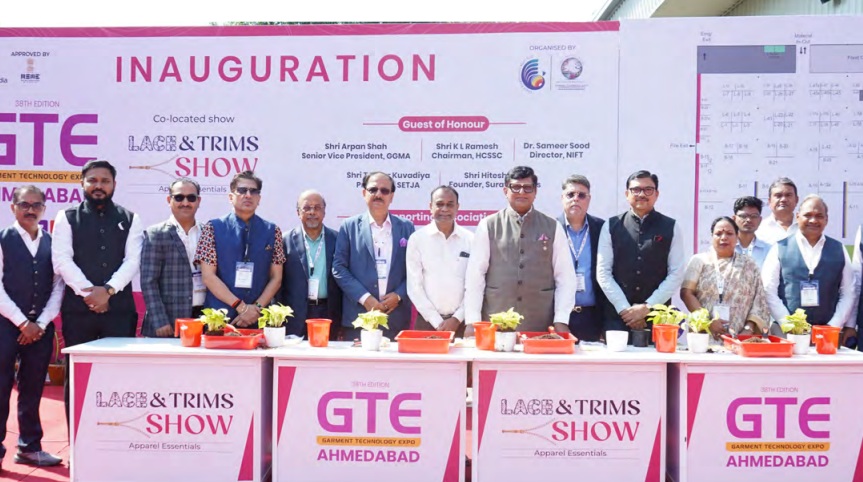FW
India is looking to be self-reliant in raw silk and plans to bring down imports to zero level by 2020. K M Hanumantharayappa, Chairman, Central Silk Board (CSB) says with consistent supply of raw silk of high quality in adequate quantities and increased production of bivoltine silk, India will be able to attain self-sufficiency in silk.
To achieve this objective, CSB has been making concerted efforts and is developing new technologies for quality cocoon production and its conversion into silk yarn of global standards. Currently, the silk production is around 28,000 tons of which 10,000 tons account for crossbreed Mulberry variety.
Hanumantharayappa further said that there is a gap between silk production and demand. Besides shortage of skilled manpower is forcing imports. To bring this to an end, the Central Silk Technological Research Institute (CSTRI) under funding from the board has developed indigenous Automatic Reeling Machine (ARM) and it will be supplied to reelers from next year.
The Board is launching its second Centre of Excellence (CoE) at its headquarters in Bengaluru which is expected to be inaugurated by Union textile minister Smriti Irani. Managed by the CSTRI, the CoE will conduct specialised skill training and advanced short-term and long-term courses in silk reeling, spinning, twisting, weaving, processing, finishing and computer-aided design development and colour matching, besides packaging.
It was a historic day for the Chhindwara centre of the Apparel Training & Design Centre (ATDC) when President of India, Pranab Mukherjee, graced the campus on December 14. The President and other dignitaries, including Madhya Pradesh Governor Om Prakash Kohli were received by Sr.Vice Chairman, ATDC Hari Kapoor, G S Madan, Vice Chairman, ATDC and Darlie Koshy (DG&CEO, ATDC & IAM) at the campus.
The President was given a tour of ‘Mission to Movement’ display by ATDC and detailed demonstration of every work station including cutting machines, computerised sewing machines, the pattern making room etc. at the Centre. Later President Pranab Mukherjee interacted with the Smart Sewing Machine course students and new B Voc courses candidates at the Integrated Campus.
He appreciated the infrastructure and quality of training at ATDC as trainers focus on providing maximum hands-on technical skills through practical approach in simulated factory like training infrastructure of ATDC, supported by factory visits and internships.
The ATDC is committed towards the ‘Skill India Mission’ dedicated to apparel sector and is doing its best to spread technology and skills as the largest vocational training provider for the sector in order to provide skilled professional workforce to the nation to improve productivity and efficiency for long-term competitiveness. The Centre has emerged as the largest vocational training provider for the textile-apparel-chain offering a comprehensive bouquet of courses for career progression in an integrated manner by creating a step ladder – training eco – system with clear focus on skilling of aspirational Indian youth for the rapidly growing export-domestic apparel sectors.
If Bangladesh can create an adequate number of skilled manpower in design and provide all kinds of apparel solutions to retailers, achieving $50 billion in garment exports by 2021 is possible. In fact, the country can go beyond this level also, believes David Hasanat, Chairman and CEO of Viyellatex Group. He shared his views while spresenting the keynote paper at a roundtable on '$50 billion export target and the role of CEBAI'.
The Centre of Excellence for Bangladesh Apparel Industry (CEBAI) was launched in December 2014 to provide training for creating skilled manpower. For starters, Bangladesh must produce an adequate number of designers as the majority of the garment manufacturers mass-produce the designs supplied by retailers.
Currently, less than one per cent of manufacturers provide design support to buyers, he said. Every year more than 20,000 expatriate experts are taking away $5 billion from Bangladesh only because of shortage of skilled and technical manpower in the country. The amount that foreign experts are taking away from Bangladesh every year is bigger than the net profit made by local garment exporters, Hasanat said. Apart from skilled manpower, he suggested addressing the challenges such as occupational safety, power and gas supply, improving port services and transportations, market diversification and political stability. Bangladesh is the second largest exporter of garment items in the world, with a 6 per cent share of the $450 billion global market. China is the number one exporter with a 39 per cent share.
"Despite the demonetization drive, which has affected domestic and export industry sentiment, the Yarn Fabric & Accessories Trade Show; YFA 2016 which held from November 23-26, 2016 in New Delhi, saw visitor numbers going up 15 per cent over previous edition to touch 8,598 buyers. A majority of the 148 exhibitors participating at the show also expressed satisfaction with the numbers as well as quality of the buyers."

Despite the demonetization drive, which has affected domestic and export industry sentiment, the Yarn Fabric & Accessories Trade Show; YFA 2016 which held from November 23-26, 2016 in New Delhi, saw visitor numbers going up 15 per cent over previous edition to touch 8,598 buyers. A majority of the 148 exhibitors participating at the show also expressed satisfaction with the numbers as well as quality of the buyers.
As against around 100 exhibitors in 2015, there were 148 participating companies at YFA 2016. The highlights of the exhibition were fashion shows held throughout the day on all the days as well as in the evening. There was also a Chinese pavilion, in which 36 Chinese exhibitors showcased innovative yarns, fabrics and garment accessories.
Who’s who make their presence

The exhibitor list included the who’s who of Indian and global textile industry across the textile value chain from fibres to garment accessories, including the likes of Indo Rama Synthetics, Bhilosa Industries, Vardhman Textiles, and many others. Some companies exhibited and a few launched innovative and latest developments in value-added textile products like speciality fibres, multifunctional yarns, mélange yarns, spandex yarn, embroidery yarn, bamboo fabrics, modal fabrics and several unique garment accessories.
Among the visitors, were sourcing heads, purchase managers, head merchandisers, country managers etc. YFA Trade Show 2016 New Delhi also saw buying houses for H&M, Gap, Triburg, Decathlon, Marubeni India, Impulse, ITOCHU India, Alliance, TQM Global Buying, NEXT Sourcing, JC Penney, and many more.
Speaking about his experience, Maheshwari, Director, Nimbark Fashions, said, “Despite the currency crisis, we have had genuine as well as decision makers visiting our booth. We were able to make new contacts.” Pinkesh Jain, CMD, Everflow Petrofils, added, “We are satisfied with our participation at the YFA 2016 show. We have seen a steady stream of buyers visiting our stall, not just from Delhi or North India, but also other parts of India, which includes, buying houses, exporters, domestic brands, etc.”
“We met many new as well as existing buyers. It was satisfying to revive relations with buyers who used to purchase from our mills earlier,” said Pankaj Bhardwaj, AVP (Yarn Marketing) at Nahar Industrial Enterprises. “We had a good number of buyers at our stall and met many buyers from buying houses, exporters, etc and also from foreign countries,” said Tina Zhang, Hubei Jinghua Group from China.
Insightful conference
A textile conference in association with TIT-Bhiwani and the Textile Association of India (TAI) Delhi was also arranged on the sidelines on Day-1. The first panel discussion was on ‘Growth & Prospects of Handloom Industry,’ and the second panel discussion was on ‘Make in India – Innovation in Textiles’. This was followed by a presentation by Prof Rajendrakumar Anayath, Director, TIT Bhiwani on ‘Beyond Engineering: Emergent Materials & the next Interface’. ‘Titoba’, an alumnus meet, with a gathering of more than 400 top industry professionals, in association with TIT Bhiwani and again the Textile Association of India (TAI) Delhi was also organized.
India has close to 2.3 million handlooms with major centers in Andhra Pradesh, West Bengal and Madhya Pradesh. The handloom industry in India is among the largest in the world. Almost 90 per cent of the world’s handlooms come from India. This industry employs close to ten million artisans in India and is considered the second largest income generating activity after agriculture in rural India.
A weaver can produce fabrics worth at least Rs 30,000 to Rs 50,000 a month. The cost of material is usually 10 to 15 per cent; this gives a handsome return on investment in only about two to three months. The handloom sector employs 10 million artisans and can employ more. It can enable reverse migration possibilities, from urban to rural, and reduce stress on urban infrastructure.
There are multiple tech disruption possibilities here. Handloom has the opportunity to create a cab aggregator type of business model, which enables matching of disaggregated demand and supply. There is disaggregated supply (2.3 million handlooms scattered across India) and disaggregated demand (rural, urban and international).
Handloom is well suited to rural India where there are power problems as it does not depend on electricity. Power looms can’t give hand woven custom-made designs. Handlooms can.
With the number of orders receding despite the marriage season, weavers in the silk city Berhampur in Odisha are feeling the heat of demonetization as cooperatives are unable to pay these artisans, apparently due to cap on the withdrawal limit. Sale of Berhampuri pattas have come down 60 per cent while cooperative societies are struggling to pay weavers their wages due to the cash crunch, says T Gopi, President, All Odisha Devanga Mahasangh.
There is a huge demand for ‘Berhampuri pattas’, famous for its ‘phoda kumbha’ and ‘patta’ and ‘joda’ (for men). These are mostly sold through cooperative societies like’Boyanika’. The annual sales turnover of the ‘patta’ is around Rs 2.50 crore to Rs 3 crore.
The Berhampur Cotton and Silk Cooperative Society is also facing problems in paying weavers. While earlier they used to take payment in cash at the time of delivery, now they are reluctant to take cheques. The cooperatives have asked weavers to open accounts in which the money would be transferred. Over a long period of time, ‘sari’ woven from Berhampuri silk, has been exported to Southeast Asian countries. The sari and joda have got the geographical indication (GI) tag from the Centre.
To enhance Pakistan's export competitiveness and institutional strengthening under the Strategic Trade Policy Framework (STPF) 2015-18, the federal government would spend Rs 20 billion in the next three years. In response to emerging international changes, several other initiatives are being implemented to enhance the export basket and market share. The total volume of Pakistan's exports that was $24.5 billion in 2013 fell to $20.8 billion in 2016.
Among the steps taken by the government to enhance exports are: sales tax zero-rating regime for five export oriented sectors comprising textile, leather, carpets, surgical and sports goods has been introduced from July this year. The other steps were establishment of Export Promotion Council for Pharmaceuticals & Cosmetics, and Rice Export Promotion Council, support for import of plant & machinery to strengthen supply chain and encourage value addition and performance based incentive (PBI) to offset burden of higher utility costs and local levies and taxes on export sectors.
Under short-term export enhancement measures, four product categories comprising basmati rice, horticulture, meat and meat products and jewellery were aimed at with parallel focus on markets including Iran, Afghanistan, China and European Union. An additional Rs 6 billion was available this fiscal year to exporters through Textile Policy. 2014.
Of the total €81 billion import of clothing from 28 countries to the European Union, 77 per cent is from Asia. That is almost double of what came out of Asia just 10 years ago. As is already known when import increases, prices drop. In the last 10 years, clothing import from the EU grew €32 billion with €30 billion coming from Asia alone. Out of that €30 billion, 75 per cent was from China and Bangladesh. The low costs and high concentration of companies makes it increasingly interesting to import clothing from Asia.
Some countries even live off of the export: clothing represents 47 per cent of Bangladesh’s total export in 2015 and Cambodia (27 per cent) and Sri Lanka (17 per cent) also benefit from the clothing industry. The consumer also takes advantage of the low costs in Asia. In the last two years, prices have dropped nearly 4 per cent and the 2015 levels were lower on average than that 10 years ago. Prices are also at their lowest in the last 10 years. The peak was in 2007, when clothes were nearly 4 per cent more expensive than in 2015.
SPGPrints and Stovec Industries printing machihe evoked keen interest at the recent India ITME 2016 in Mumbai. SPGPrints and Stovec displayed several inkjet and rotary screen printing machines at ITME 2016. Many printers showed keen interest in SPGPrints’ Javelin ® digital inkjet textile printer. Sales were recorded for both the 1850mm-width version of the machine for the apparel market and the new 3200mm-width version for interior decor applications. The new 3200mm-width Javelin will have its global debut at Heimtextil 2017.
India ITME 2016 marked the first showing of the Javelin printer in India. The machine was operated throughout the show giving visitors a real-time experience of its quality, flexibility, productivity and ease of use on even the most challenging substrates such as millimetre paper. Using Archer® technology, Javelin fires a variable ink drop a distance of 4mm, enabling a wide range of textiles to be printed with sharp detail, smooth gradations, solid blotches and precise registration.
SPGPrints also saw strong demand for its rotary screen technology, with several sales of the company’s printing lines and digital prepress systems. Sales were recorded of the RD-6 rotary screen printing line, which combines high productivity, rapid design changeovers, straightforward operation and quality consistency with minimal manual input.
World's biggest clothing retailer, Inditex has reported a 9 per cent rise in its nine-month profit. It also reported that its sales growth jumped in recent weeks despite warmer than usual autumn weather in many European countries.
As its fashion peers struggle to adapt to changing consumer tastes with Abercrombie & Fitch and Gap posting dismal Q4 sales last month, Inditex's fast-fashion business and online prowess have kept it ahead. The owner of Zara is known for speedily reacting to changing trends and weather by keeping its manufacturing bases close to its distribution centre in the northern Spanish region of Galicia. Items are designed, made and shipped to stores often in less than a month, which boosts its profitability.
Items such velvet dresses, military blazers and mini-skirts helped push sales up 14.5 per cent in local currencies in the nine months to October 31. Net profit was up 9 per cent at €2.2 billion ($2.3 billion) while earnings before interest, tax, depreciation and amortisation (EBITDA) were up 8.4 per cent at €3.6 billion, both results in line with anaysts' forecasts, according to a poll.












